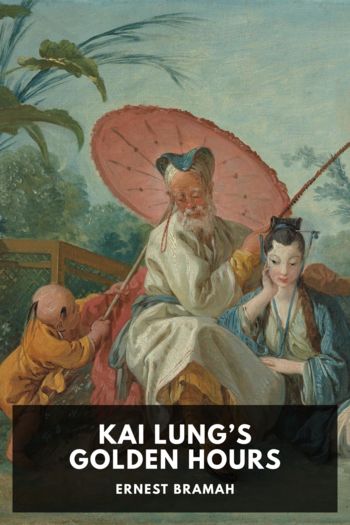Kai Lung’s Golden Hours - Ernest Bramah (the reading strategies book .TXT) 📗

- Author: Ernest Bramah
Book online «Kai Lung’s Golden Hours - Ernest Bramah (the reading strategies book .TXT) 📗». Author Ernest Bramah
The time in which we live affords very few of such moments of relief: here and there a good piece of verse, in The New Age or in the now defunct Westminster: here and there a lapidary phrase such as a score or more of Blatchford’s which remain fixed in my memory. Here and there a letter written to the newspapers in a moment of indignation when the writer, not trained to the craft, strikes out the metal justly at white heat. But, I say, the thing is extremely rare, and in the shape of a complete book rarest of all.
The Wallet of Kai Lung was a thing made deliberately, in hard material and completely successful. It was meant to produce a particular effect of humour by the use of a foreign convention, the Chinese convention, in the English tongue. It was meant to produce a certain effect of philosophy and at the same time it was meant to produce a certain completed interest of fiction, of relation, of a short epic. It did all these things.
It is one of the tests of excellent work that such work is economic, that is, that there is nothing redundant in order or in vocabulary, and at the same time nothing elliptic—in the full sense of that word: that is, no sentence in which so much is omitted that the reader is left puzzled. That is the quality you get in really good statuary—in Houdon, for instance, or in that triumph the archaic Archer in the Louvre. The Wallet of Kai Lung satisfied all these conditions.
I do not know how often I have read it since I first possessed it. I know how many copies there are in my house—just over a dozen. I know with what care I have bound it constantly for presentation to friends. I have been asked for an introduction to this its successor, Kai Lung’s Golden Hours. It is worthy of its forerunner. There is the same plan, exactitude, working-out and achievement; and therefore the same complete satisfaction in the reading, or to be more accurate, in the incorporation of the work with oneself.
All this is not extravagant praise, nor even praise at all in the conventional sense of that term. It is merely a judgment: a putting into as carefully exact words as I can find the appreciation I make of this style and its triumph.
The reviewer in his art must quote passages. It is hardly the part of a Preface writer to do that. But to show what I mean I can at least quote the following:
“Your insight is clear and unbiased,” said the gracious Sovereign. “But however entrancing it is to wander unchecked through a garden of bright images, are we not enticing your mind from another subject of almost equal importance?”
Or again:
“It has been said,” he began at length, withdrawing his eyes reluctantly from an unusually large insect upon the ceiling and addressing himself to the maiden, “that there are few situations in life that cannot be honourably settled, and without any loss of time, either by suicide, a bag of gold, or by thrusting a despised antagonist over the edge of a precipice on a dark night.”
Or again:
“After secretly observing the unstudied grace of her movements, the most celebrated picture-maker of the province burned the implements of his craft, and began life anew as a trainer of performing elephants.”
You cannot read these sentences, I think, without agreeing with what has been said above. If you doubt it, take the old test and try to write that kind of thing yourself.
In connection with such achievements it is customary today to deplore the lack of public appreciation. Either to blame the hurried millions of chance readers because they have only bought a few thousands of a masterpiece; or, what is worse still, to pretend that good work is for the few and that the mass will never appreciate it—in reply to which it is sufficient to say that the critic himself is one of the mass and could not be distinguished from others of the mass by his very own self were he a looker-on.
In the best of times (the most stable, the least hurried) the date at which general appreciation comes is a matter of chance, and today the presentation of any achieved work is like the reading of Keats to a football crowd. It is of no significance whatsoever to English Letters whether one of its glories be appreciated at the moment it issues from the press or ten years later, or twenty, or fifty. Further, after a very small margin is passed, a margin of a few hundreds at the most, it matters little whether strong permanent work finds a thousand or fifty thousand or a million of readers. Rock stands and mud washes away.
What is indeed to be deplored is the lack of communication between those who desire to find good stuff and those who can produce it: it is in the attempt to build a bridge between the one and the other that men who have the privilege of hearing a good thing betimes write such words as I am writing here.
Hilaire Belloc
Kai Lung’s Golden Hours I The Encountering of Six Within a WoodOnly at one point along the straight earth-road leading from Loo-chow to Yu-ping was there any shade,





Comments (0)